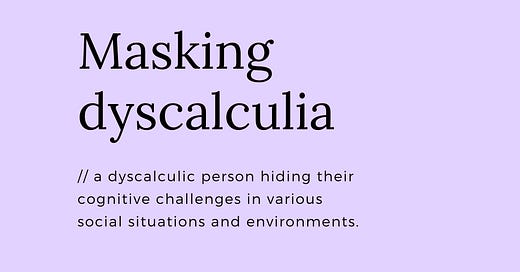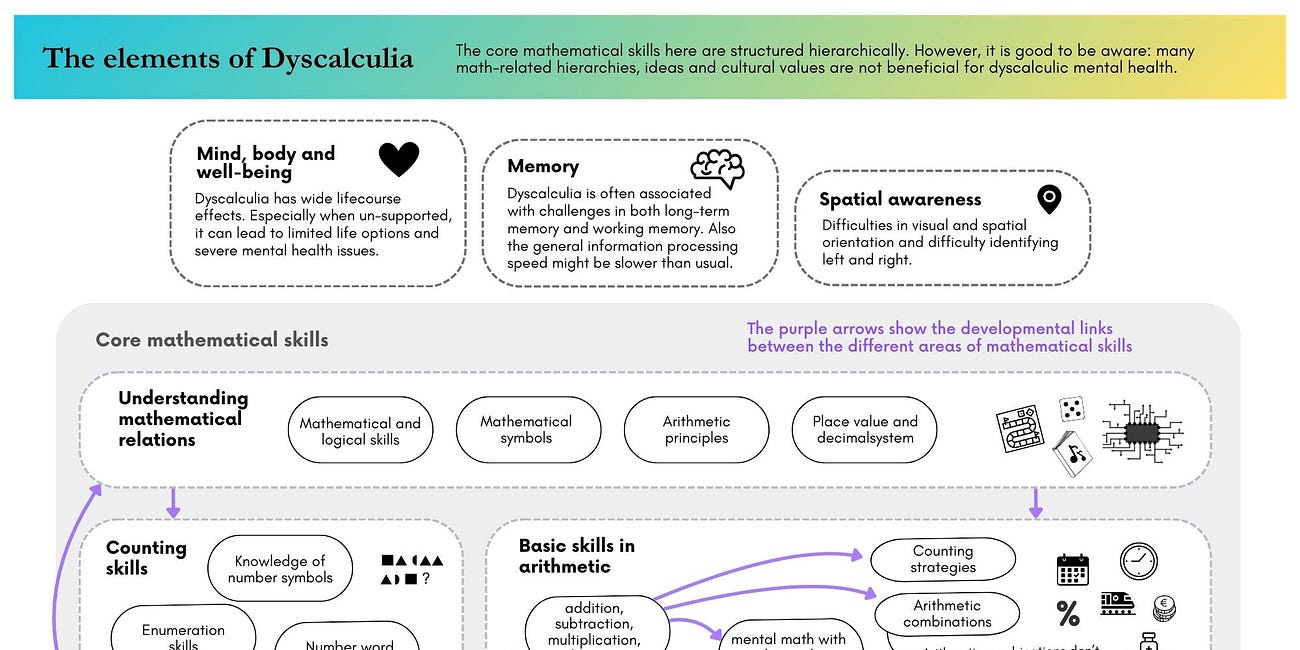In this article I write about dyscalculia masking based primarily on my own experience, with some reference to external sources. I am a late-diagnosed adult with dyscalculia, and both having dyscalculia and being late diagnosed bear significance in the context of what I describe in this article. I’m also AuDHD.
In the first chapter I will briefly describe what dyscalculia masking means. In the second chapter I go through the benefits of unmasking.
In chapter three I examine what characterizes unmasking dyscalculia in work life. This is because I’ve noticed that telling people about my autism or ADHD feels relatively possible nowadays, also in work settings, but bringing up dyscalculia? That’s a whole other story.
In chapter four I reflect on what I wish I had known when I first began unmasking at work.
Chapter five provides a brief summary.
1. Dyscalculia masking
In psychology and sociology, masking is referred to as social camouflaging. In the context of neurodivergence, the need to mask often stems from the pressure to conform to the neuronormative expectations of the society.
In the context of dyscalculia, one way to define the term masking, could be: “the extent to and the means, methods and strategies, with witch a dyscalculic person is hiding and compensating their dyscalculia-related cognitive difficulties.”
There is a wealth of high-quality academic longitudinal studies available on how poor mathematical skills create specific vulnerabilities in the workplace1, but to my knowledge, there is currently no academic research addressing dyscalculia masking. (So here’s a fresh topic calling for researchers!)
The dyscalculic community carries a lot of internalized shame and trauma associated with math, numeracy, and the societal and cultural hierarchies related to them. Many core reasons for dyscalculic mental health challenges are most likely rooted around these issues. This shame and stigma are major drivers for why dyscalculic people need to mask their learning difficulty / neurodivergence.
Dyscalculic people hide their challenges in many ways, especially in work settings, but also in other social situations that take place on the free time. Masking can be conscious or unconscious, but either way it creates stress for the dyscalculic, neurodivergent individual.
2. The benefits of unmasking
Stopping or gradually reducing dyscalculia masking can have significant positive effects on your well-being. Openly discussing dyscalculia makes it more possible to receive appropriate support. Sharing about your dyscalculia in safe environment can also strengthen self-perception and boost self-esteem.
Many late-diagnosed dyscalculics feel, that for a long time it has been difficult to them communicate their cognitive experiences to the outside world. The description: 'being mad at math' doesn’t capture the full scope of their challenges. And in many ways this is true. In addition to math skills, dyscalculia can impact your memory and spatial awareness. It also has correlation to negative mental health2.
Unmasking dyscalculia usually starts with embarking on a personal learning process. How does my dyscalculia present? What is dyscalculia in my case? What does it mean and what doesn’t it mean?
As the personal awareness deepens, the perception of one’s own abilities becomes more accurate. Challenges start to make more sense, which makes it easier to communicate about them. This, in turn, helps to reduce everyday misunderstandings and reduce and the shame, that is often associated with dyscalculia.
Unmasking can initiate a very deep personal process, it can prompt reflection that reaches down to your sense of self-worth. There can be a lot of shame around dyscalculia, that is rooted to internalized ableism. Ableism is heavy stuff, so there can be a great deal of life-energy trapped under this weight. Starting to dismantle your internalized ableism, untangling the negative thoughts around numeracy skills, can have power to restore a lot of energy and joy into your life!
3. Unmasking and work
I'm AuDHD and dyscalculic, and I’ve noticed that the disclosing autism or ADHD at work, feels totally different from disclosing dyscalculia. And I don’t think this is related to how or to what extent the traits of each neurodivergence are expressed in me. I think it has more to do with this:
Awareness and psychological safety grow hand in hand. Dyscalculia awareness is still very low, this affects the psychological safety to talk about the issue.
In addition: in our society, there are a great deal of explicit and implicit cultural values and ideas associated to math. Being good at math is hugely valued, praised and admired, especially in the western societies. Math skills are also often directly equated with intelligence.
Math skills are a measurable ability, a “hard skill” that is held in high regard in work life.
Furthrmore: large majority of those people who have “normative numeracy skills”, are completely unaware this bias, described above.
And this is why the prejudice surrounding dyscalculia can become very apparent in work life settings. Some employers primary reaction to dyscalculia, can be pure fear. “Can this person keep on top of anything? Can they remember any numbers? Can they count at all? Are they completely disorganized and incompetent?”
It is good to be aware, that if and when you disclose your dyscalculia at work, there is a possibility that you’ll have to face some quite heavy generalisations, stereotypes and misconceptions.
4. What I wish I would have known?
This is what I wish I would have known before starting to unmask at work life environments:
You are allowed to set boundaries. Take care of yourself and your well being. You are not obliged to explain your dyscalculia.
The impact of dyscalculia at a certain job, is the result of many factors. The individual variation in dyscalculia huge, and so is the variation of the cognitive demands in different jobs.
There are dyscalculic people, who work in fields that are generally considered as “mathematical”. Like for example as engineers or architects. Nevertheless, some dyscalculics could not, for the life of them, work in such professions.
Dyscalculia can also cause challenges in fields of work, that are generally considered "non-mathematical".
A learning disability is always a private matter3. A person with dyscalculia is under no obligation to disclose their dyscalculia at work or when seeking employment.
However, if you feel it would be important for you to disclose your dyscalculia at the work context, it is definitely worth doing so. This also makes it more possible for you to receive support.
The workplace should be able to offer accommodations, if needed.
If you bring up and share that you have a learning disability (dyscalculia), the employer can, for example, ask what kind of arrangements are needed in the workplace. Questions other than those related to the job, should not be asked4.
Employers should be obligated to educate themselves about dyscalculia in order to create an inclusive workplace. Still, the current reality is, that to make the conversation safer for you, you might need to educate the employer.
Is there information available in your language regarding dyscalculia, particularly in relation to the workplace? If not, I strongly suggest you look into international sources.
5. Summary
Dyscalculia masking refers to individuals hiding their math-related difficulties to meet societal expectations, often also due to shame and stigma. Though common, dyscalculia masking remains under-researched.
Unmasking can improve well-being, self-awareness, and access to support, it can also lead to a personal journey that involves confronting internalized ableism and redefining self-worth.
In the workplace, dyscalculia is less understood than other neurodivergences, this makes disclosure riskier. Cultural biases linking math to intelligence can lead to harmful stereotypes.
I want to I emphasize the importance of setting boundaries, recognizing the wide variability in how dyscalculia affects individuals, and knowing that disclosure is always a personal choice.
Further sources:
Dyscalculia Network: masking and unmasking
Dyscalculia Network: Strategies to support dyscalculic employees
If you are interested in tuning in to some peer-discussion, A warm suggestion for the Accessible numbers -podcast, episode 2: Dyscalculia in adulthood.
xxxSasu
Concept map / The elements of Dyscalculia
The first and the second chapter of this article give information about the content of this concept map and a brief description, of the life impacts that are often associated with dyscalculia.
Geary, David C. (2011) Consequences, Characteristics, and Causes of Mathematical Learning Disabilities and Persistent Low Achievement in Mathematics. Journal of Developmental & Behavioral Pediatrics. https://www.researchgate.net/publication/49802666_Consequences_Characteristics_and_Causes_of_Mathematical_Learning_Disabilities_and_Persistent_Low_Achievement_in_Mathematics
Parsons, Samantha; Bynner, John (1997). Numeracy and employment. Education and training. March 1997 DOI: 10.1108/00400919710164125 https://www.researchgate.net/publication/240959556_Numeracy_and_employment
Hakkarainen, Airi (2016) Matematiikan ja lukemisen vaikeuksien yhteys toisen asteen koulutuspolkuun ja jatko-opintoihin tai työelämään sijoittumiseen. (The link between maths and reading difficulties and the pathway to secondary education and further studies or employment.) Väitöskirjatutkimus. Joensuun yliopisto. Dissertations in Education, Humanities, and Theology. https://erepo.uef.fi/items/45d921c2-df92-4920-8338-acf4e78803df
Parsons, Samantha; Bynner, John (2005). Does numeracy matter more? National Research and Development Centre for Adult Literacy and Numeracy. Institute of Education. University of London. https://discovery.ucl.ac.uk/id/eprint/1566245/1/parsons2006does.pdf
Aro, T., Eklund, K., Eloranta, A.-K., Närhi, V., Korhonen, E., & Ahonen, T. (2019). Associations Between Childhood Learning Disabilities and Adult-Age Mental Health Problems, Lack of Education, and Unemployment. Journal of Learning Disabilities, 52(1), 71-83. https://doi.org/10.1177/0022219418775118
Aro, T., Özbek, A. B., & Torppa, M. (2024 a). Predicting adult-age mental health with childhood reading and math disability: do resilience and coping styles matter? Annals of Dyslexia, 74(1), 97-122. https://doi.org/10.1007/s11881-023-00290-8
Oppimisvaikeus.fi: Tukea työelämään: https://www.oppimisvaikeus.fi/tukea/tukea-tyoelamaan
Oppimisvaikeus.fi: Tukea työelämään: https://www.oppimisvaikeus.fi/tukea/tukea-tyoelamaan






Wow this is soooo informative! I never thought of myself as masking my dyscalculia, but I was! (I'm too old to care anymore lol) And this is the first time it even crossed my mind that this could be something discussed in the workplace. You bring great awareness to this stuff, thank you.